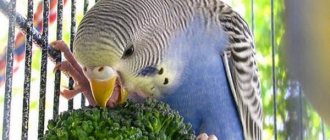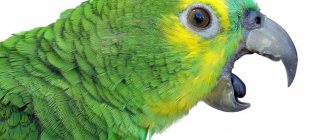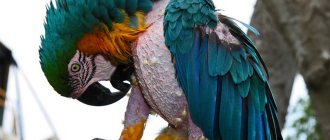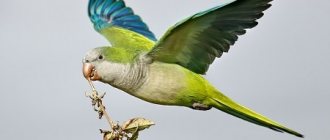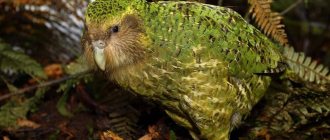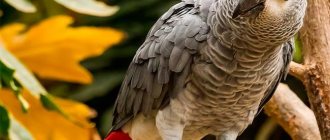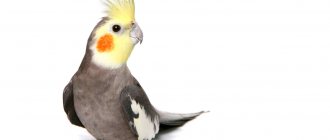A healthy bird has a perky disposition, sparkles of joy appear in its eyes, and its movements are light and playful. The appearance of tremors in the body causes illness, improper feeding, exhaustion, and weakening. Often the situation can be resolved on your own. If the pet does not respond to contact, does not go for a walk, but sits in one place with its wings ruffled, it needs specialized treatment from a veterinarian and special care.
Avitaminosis
The parrot is shaking due to a lack of vitamins. You should consult your veterinarian about this. Perhaps changing the food to one enriched with microelements will help. After consultation, a vitamin supplement is chosen for the main diet. Feeding with fresh vegetables and fruits cannot be ignored. Almost everything suits parrots except papaya, persimmons and nuts. It is also necessary to offer the bird greens:
- sorrel;
- dandelions;
- wheatgrass;
- shepherd's bag
The main thing is to find out in time why the parrot begins to shake.
The bird shakes its tail
There are times when a parrot shakes its tail, breathes heavily and frequently. These symptoms may be caused by a respiratory illness. There may also be problems with the respiratory tract caused by a cold or tumor.
It is necessary to find out why the parrot's tail begins to shake. If a bird shakes its head and tail, this may mean that it has a headache. Pressure changes, injuries and stress are inherent in birds, just like humans.
A parrot can also shake from a minor injury. Often this movement appears reflexively in the bird and remains for life.
You can understand why a parrot shakes its tail by examining the cloaca. If the bird has no feathers in this place, the tail trembles, there are traces of inflammation, this means that there are problems with digestion, liver, or an oncological process has begun. In this case, you need to immediately visit a doctor.
There may be several reasons for the strange behavior of a feathered pet. It must be remembered that attention to the slightest change in the behavior of a bird can save the life of a pet.
The parrot is shaking
Many parrot owners are often concerned with the question, why is their pet trembling? Chills can be caused by hypothermia and excitement, as well as by more serious causes, stress and infectious diseases.
Parrots have a highly developed nervous system and they react very vividly to any changes in the environment. The behavior of a newly purchased pet placed in an unfamiliar environment will indicate how easily it adapts to change. If your parrot's tail is shaking or its wing is trembling, it may take some effort to get it comfortable in its new habitat.
It may take about two weeks for your parrot to adapt.
During this period, try not to annoy your pet; too intrusive attention can stress him out.
Some useful tips:
- Place the cage at eye level. If you look at your parrot from above, it will feel depressed.
- The cage must always have fresh water and high-quality fortified food.
- Do not allow children to make noise and scream near the cage or pester the parrot.
- Keep other pets away from the cage as they may frighten the bird.
- Accustom your pet to you gradually. Cover yourself with a blanket along with the cage, try to take the parrot in your hands and talk to him affectionately.
If the bird's condition does not improve after 2 weeks, try to identify possible other reasons why the parrot is trembling.
First aid
If your parrot shows symptoms of illness, you should not use dubious solutions recommended on the Internet. Post-traumatic tremors develop as a result of pain (observed after fractures). If the individual is ruffled and trembling, damage to the wing or lower limb is visually visible, treat the wound, put the “sick” in a box with a soft blanket and take it to the veterinarian. The pet will be grateful to you for your care and attention.
Goiter inflammation
This is a disease of granivorous birds, often occurring with vague symptoms. The main symptom is inflammation of the goiter sac. In addition, the bird:
- shakes and stretches his neck;
- behaves restlessly;
- constantly regurgitates food;
- becomes lethargic;
- refuses food.
In advanced cases, the parrot spits out food, the mucous membranes become bluish, and the crop sags. The pet cannot swallow at all, its beak often opens, viscous saliva appears, and the feathers on its head stick together. The bird subsequently dies. This condition leads to:
- poor quality food;
- poisoning from toxic plants or chemical vapors;
- complication after infectious diseases.
It happens that a bird does not receive the necessary mineral elements and compensates for them by stuffing its crop with grain, which leads to inflammation.
The disease is often detected at a stage when it is practically impossible to help the pet. As a rule, treatment at home cannot save the bird; an urgent visit to the veterinarian is necessary. It is important not to miss the symptoms and find out why your pet parrot's head begins to shake.
For this purpose, an examination is carried out. Antibiotics are used only if the infectious origin of the disease is confirmed. In parallel with the main treatment, medications are given to support the liver. To avoid exhaustion, the bird is fed liquid porridge.
Stress
Stress in a bird can manifest itself as trembling. It is necessary to find out why the bird began to feel chills. Loud sounds, unknown people and animals can cause an anxious reaction in a parrot, which, in the absence of its owners, is frightened by the aggressive behavior of other pets - cats or dogs. A change in home, environment, or owner also negatively affects the condition of the bird.
There is no need to panic. It is necessary to create a calm, friendly environment for the pet, allow the bird to look around and settle in, and eliminate loud and harsh sounds. Over time, the pet will calm down and the trembling will go away.
Diseases of the budgerigar accompanied by trembling
Frequent diseases that are accompanied by trembling are:
- A symptom of poisoning is trembling. Digestive disorder.
- Cold.
- Infectious diseases.
- Diseases of internal organs.
- Poisoning.
- Parasitic diseases.
In addition to trembling, the pet experiences weakness, difficulty breathing, and its eyes are usually closed. Since the parrot quickly loses strength, it sits at the bottom of the cage. Self-diagnosis and treatment are not advisable; immediate consultation with a doctor is recommended.
Tracheal mite
This avian parasite causes a disease called sternostomosis. This disease affects the internal organs, larynx and trachea. Due to difficulties with swallowing and breathing, the parrot begins to actively shake its head and may even spit out grains. You can understand why a parrot shakes its body if you track other symptoms. At first, there is a partial loss of voice, coughing, and wheezing.
To accurately diagnose the disease, it is necessary to take a tracheal smear to check for parasites. A litter analysis is also needed. If the test shows the presence of mites, the veterinarian will prescribe treatment.
Important! The dosage of medications, the treatment itself and its duration are determined only by a specialist.
The prescribed medications are taken for about 2 weeks.
Why is he shaking his head?
Your pet may shake their head for many reasons:
- Looking for someone.
- Be sick.
- Particles of grains remained in the crop.
- Presence of a tracheal mite.
To exclude these diseases, it is necessary to conduct a visual inspection for damage and palpate the bird’s body: wings, legs, torso. A healthy individual shakes its head for reasons of anxiety, fear or curiosity. The inflammatory process may be accompanied by nausea and diarrhea.
The grains are stuck in the crop
Cockatiels and budgies should not be fed large, unmilled grains. If swallowed, the bird may not completely separate them, which will cause pain in the crop. The stuck piece can be felt with light movements. Ignoring the symptom leads to the death of the pet. Trembling in the body is sometimes accompanied by food coming out of the beak, which can occur in case of overeating.
Presence of a tracheal mite
The tracheal mite is a parasite that lives in the upper respiratory tract of birds and feeds on the contents of the secretion, affecting the respiratory system: trachea, larynx. As the mite grows, it limits access to oxygen. When trying to breathe, the cockatiel begins to shake its head from side to side.
It is necessary to take a smear for parasites and analyze the droppings. After receiving the result, the doctor prescribes antiparasitic drugs if necessary. The treatment process lasts 2 weeks. The first symptoms of the onset of the disease are wheezing, coughing and slight loss of voice. The symptom of trembling can also cause other parasitic diseases that appear against the background of vitamin deficiency.
If your pet continues to tremble for 24 hours, you should take your cockatiel to the veterinarian.
Nausea
Nausea and tremors in birds appear due to poor nutrition, failure to observe meal times, the presence of difficult-to-digest food components, scarcity of vitamins in the feed, and monotony of the diet. If the symptom is not cured in time, then gradually the movements become slow, the bird is passive, apathetic to everything, the pet often shakes its head, trying to get rid of the unpleasant symptom on its own.
Nausea can be the cause of poisoning, symptoms of parasitic diseases, skull trauma, and pathological processes of the digestive system. In such cases, the cockatiel needs care and a special treatment method.
Tumor of the swallowing organs
The tumor is a rare disease of birds, which during the growth process blocks access to air. During life, malignant cancer releases toxic substances into the blood, and during decay, toxic compounds that cause inflammatory processes, increased body temperature, which results in chills. Small tumor-like growths interfere with the development of vocal melody, and the individual begins to shake its head.
The process manifests itself in the form of symptoms: body trembling, difficulty swallowing, tickling.
A tumor of the respiratory organs is caused by inflammatory processes. In this case, it is necessary to apply dry heat to the sore spot and give the bird only warm water to drink. If the procedures are performed frequently, the swelling will be relieved quickly. Impaired swallowing is a dangerous symptom; if it is not eliminated, the pet will die from suffocation.
Injury
If the parrot has suffered a spinal injury, where the nervous system is involved, the initial symptoms will appear in the form of head twitching. If the parrot experiences pain, then it is necessary to find out where the damage occurred.
Main reasons
The causes of bird's yeast can be:
- Avitaminosis.
- Strong fear.
- Tracheal mite.
- Someone else's apartment or new environment.
- Large grains stuck in the crop.
- The parrot is frozen.
- Inflammatory processes.
Stress
Fear, which appears due to various circumstances, causes stiffness in movements, the bird freezes and cannot fly freely.
Often the appearance of anxiety is provoked by: the ringing laughter of approaching children, barking dogs, the sound of restless noise will greatly frighten the bird, the consequences are fraught with cardiac arrest.
In such cases, it is necessary to caress the parrot, it is necessary to eliminate threatening factors, to calm the bird:
- Remove animals.
- Take the children out of the room.
- Turn off the equipment.
- Close the door.
If the pet constantly sleeps, it does not mean that the parrot is sick; nervous shocks and worries may occur.
Hypothermia
The bird's thin cover of feathers is designed to exist in a warm temperate climate, so the pet may not be able to withstand drafts. If a parrot sits on a perch like a mouse and the feather cover is noticeably inflated, the parrot is trembling - this indicates the launch of thermoregulation processes in the body.
If the reason for the bird's trembling is cold, it is necessary to eliminate the draft (close the window, doors), place the parrot near a radiator or heater and no longer allow the bird to become hypothermic, move the cage to the upper part of the room or cover the cage with a thick cloth, leaving one side half-open. Place a bottle of hot water in the cage; the steam will create heat. If your pet is constantly shivering, this means severe hypothermia.
Avitaminosis
The lack of microelements and vitamins for normal body function begins with a disruption of the nervous system. Imbalance occurs due to insufficient supply of nutrients to the body. With poor nutrition, immunity and appetite decrease, and organs become vulnerable to the development of various diseases. The bird's tail, wings, and limbs are trembling from exhaustion and weakness. A parrot (be it a budgerigar or a cockatiel) needs a balanced diet and rest, otherwise the pet will tremble for a long time.
To provide assistance, you will need to add fortified components that are found in berries and fruits to the diet; it may be necessary to switch your pet to another food rich in vitamins and minerals. Do not feed nuts, papaya or persimmons. Herbs rich in microelements include: shepherd's purse, sorrel, wheatgrass and dandelions; Finely chop the plants and place them in the feeder. The cockatiel must live outside of the cage to fully expand its wings.
The pet will not tremble after consuming fortified food.
Disease
Constant and periodic trembling sometimes becomes the cause of the onset of illness: infectious, parasitic in nature, intoxication, digestive disorders. In this case, symptoms are added: the eyes are closed for a long time, breathing is difficult, the individual is inactive, sits in one place, and does not fly.
To carry out a diagnosis, you must contact a veterinary clinic, where the appropriate medications will be prescribed. If your budgie or cockatiel is breathing heavily, you need to find out the cause and fix it. To establish a diagnosis, it is better not to self-medicate but to take the bird to a veterinarian or ornithologist.
The cause of trembling may be a symptom of inflammation in the body, in which case the bird must be prescribed antibiotics.
Prevention
To eliminate unpleasant symptoms from your pet’s life, it is necessary to create acceptable feeding and maintenance conditions:
- Include fruits and vegetables in your diet. Feed regularly with food fortified with vitamins. Food and drink must be freely available. Check expiration dates on food regularly. Do not allow moldy products to be consumed.
- Artificially adjust daylight hours, giving the opportunity to fully rest.
- Avoid hypothermia and overheating.
- Do not create conditions for stress.
- Do not leave poisonous indoor plants, medications and small objects in the public domain.
If you follow the rules of care and take proper care, a budgie can live up to 15 years. A truly careful owner can extend its lifespan to 18 years. After all, only careful treatment of your pet keeps it active for a long time.
First flights
If a young parrot's wings are trembling, it may soon attempt to fly. Your parakeet should be allowed to fly indoors for two hours a day. He must fly under supervision in a safe environment. It is necessary to remove traumatic objects and avoid contact with other pets: rats, dogs, cats.
A lack of calcium can negatively affect a bird's ability to fly. Place mineral stones and sepia, cuttlefish shell in the cage.
Contaminated air
Parrots have a special respiratory system, which includes several air sacs. During flight, these bags control body temperature, prevent overheating, and also enrich all internal systems and organs with oxygen several times better than in mammals.
This breathing system is very sensitive to various impurities in the air. Toxic particles and strong odors can be fatal, so it is necessary to ensure that perfumes, household aerosols, tobacco smoke, and air fresheners are not sprayed near the cage. During renovations in an apartment using varnishes and paints, glue, and other substances with a strong odor, the parrot should be left with relatives or friends. Toxin poisoning is difficult to treat, as it has a detrimental effect on the central nervous system and respiratory organs.
Description
Often, owners of parrots and other ornamental birds notice that their pet is breathing heavily only when it is sick, and the disease progresses, affecting the general well-being of the bird. If you notice breathing abnormalities on the first day, this will make further treatment easier.
How to help a parrot if he has trouble breathing
To correctly prescribe therapy by a veterinarian, you need to note in advance the changes that have occurred with the parrot. These may include sudden changes in weight, inappropriate behavior, convulsions and tremors of the wings. It is important to monitor whether the beak is open or closed when breathing, and whether extraneous sounds or noises are heard. This will help in making a clearer and faster diagnosis.
What to do if your parrot is shaking
- Stress . A budgie may tremble if it is nervous or afraid. Excitement may be due to a move or a change of owner. At first, it is necessary to disturb the bird as little as possible. Adaptation usually takes about a week. During this time, the parrot will get used to the new place and get used to the voice and presence of the new owner.
- Stressful situations often arise due to the presence of other pets. To ensure that your budgerigar does not experience fear and feels safe, it is necessary to limit access to the cage to other animals. It is always worth remembering that stress significantly reduces life expectancy.
- Also, the parrot's anxiety can be caused by the presence of children in the room where the parrot's cage is located. If the owner notices that the parrot is trembling, it is necessary to leave it alone. Over time, he will get used to the environment and new sounds and will stop being afraid.
- If your parrot is shivering due to hypothermia , you need to warm it up as soon as possible. You can place a special lamp next to the cage and point it towards the cage. The distance between the lamp and the cage should not be less than half a meter. The cage must be covered with fabric on two or three sides.
- A budgie may also suffer from overheating . The cage should not be placed next to heating devices, under an air conditioner, and the cage should not be exposed to direct sunlight. The optimal temperature for keeping budgies is 22-25 degrees.
- Often the reason that a parrot is trembling is due to improper or poor nutrition. A lack of vitamins in the body leads to the body weakening and being susceptible to disease. In addition to the grain mixture, the diet of a budgie should include vegetables and fruits, berries, herbs, tree branches, cereals, and mineral supplements. If your parrot refuses any food, you can purchase liquid vitamins that can be added to the water.
- of illness are noticed (vomiting, heavy breathing, discharge, unkempt appearance), you should urgently consult a specialist. He will order tests, determine the disease and severity.
- For various injuries and damage, the parrot should be carefully placed in a carrier and shown to a specialist.
If your budgerigar has been trembling for a long time, and the reason cannot be found out, you should seek help from a breeder or an ornithologist. The parrot should not be allowed to remain in this state for a long time. It is important to find out the cause of this behavior as early as possible and eliminate it.
A cold causing swelling of the larynx
A parrot's cold leads to swelling of the throat mucosa. He cannot swallow the grain, so he begins to actively nod his head, helping himself to push the food through. With this disease, a cough appears and the parrot spits out food. He begins to feel chills, the bird often sits motionless, ruffled.
Warmth becomes the cure. It is necessary to install a lamp near the cage and direct the light at the pet. The lamp power should not exceed 60 W. During heating, temperature control is necessary to prevent overheating.
Add warm water with a drop of lemon juice or honey to the drinking bowl. You can place a container with hot liquid next to the cage, into which a few drops of eucalyptus oil are added. This is how birds are inhaled.
In especially severe cases, the use of potent drugs is necessary. Only a veterinarian can prescribe antibiotic therapy.
Tags
Why does a parrot tremble? Parrot owners should tremble. Parrots often tremble. Budgerigar owners should. A budgerigar can. A budgerigar and budgerigars are susceptible. A sick budgerigar shakes. A budgerigar can shake. budgerigar will help budgerigar faster
shiverhypothermiawavymovementownersprocesseschange
Video “Diseases of parrots. Symptoms and treatment"
This video talks about why parrots get sick, how to diagnose the disease and cure it.
Was this article helpful?
Thank you for your opinion!
The article was useful. Please share the information with your friends.
Yes (100.00%)
No
X
Please write what is wrong and leave recommendations on the article
Cancel reply
Rate the benefit of the article: Rate the author ( 8 votes, average: 4.75 out of 5)
Discuss the article:

